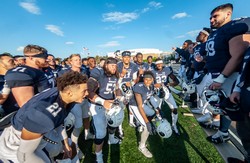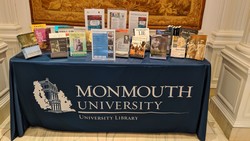The Department of Foreign Language Studies held its 15th annual Festival of Languages in Wilson Hall on Wednesday, Nov. 20.
Almost exactly a year after Superstorm Sandy cancelled last year’s festival, Dr. Mirta Barrea-Marys, the Chair of the Foreign Languages Department, and Dr. Priscilla Gac-Artigas, festival coordinator, were determined to hold the festival.
Gac-Artigas said because the event did not occur last year getting students involved was a challenge. “Last year many of [the students] invested a lot of time and effort and then there was Sandy and the festival had to be cancelled,” said Gac-Artigas. “I guess they didn’t want to go through the same this year. But once we had them on board, they all enjoyed participating.”
Gac-Artigas said, “Learning a language goes well beyond learning vocabulary or grammar in a textbook. All aspects of culture, literature, art, music, and much more teach us a lot about other people´s feelings, thoughts, ways of life and all that enrich our knowledge of the language.”
The festival showcased performances, music, poem recitals, student presentations, dance and martial art routines.
An Argentinian song titled “Los Mareados,” was performed by Frank Cipriani, a foreign language adjunct, accompanied by Bruce Gassman on accordion. “I spent much of my youth living in Argentina. During the military era, the song was suppressed, as were many songs about being drunk. So in a way, for those of us who saw the military and post military era, it represented freedom to be able to sing the song,” Cipriani said.
Another song was performed in Arabic titled, “Tastak wala Ahaleflak,” performed by Msaad Albryah, a computer science major. He said that the song was not difficult to perform necessarily because it was in Arabic, he explained he was more challenged to sing alone. “It [was] hard because that was the first time I sang in front of people,” said Albryah.
As a result of the the performance, Albryah felt inspired to teach Arabic to his peers. “I was thinking to teach [people] Arabic because I like [to] teach people my language and I found some students whom are learning Arabic, and that was really good feedback,” said Albryah.
Students also performed poems at the festival. One poem titled “Apologia y peticion” by Jaime Gil de Biedma, was performed by Andres Penfold, an undeclared major. Penfold said that the poem discusses the issues surrounding the Spanish government.
“Being from Venezuela and moving to the United Sates has always led me to be more intrigued in foreign customs,” said Penfold. “I was taken aback by the diversity in Monmouth University and how passionate everyone who was presenting was about the subject matter.”
The festival also displayed examples of daily cultural aspects done by the Chinese department. A Chinese Green Tea ceremony was presented by Adam Liscio, a computer science major, and Robert Solorzano, a business administration major.
Liscio said the ceremony lasted approximately five minutes because the actual tea drinking wasn’t a part of the performance. “During the ceremony we explained the history behind green tea as well as showed how the tea is prepared,” said Liscio.
Another student presentation involved choreographed routines. Kasey Sanders, Kelsey Haas, Ciana Woods, and Dan “Poppy” Staples performed a martial arts and dance routine called Capoeira, which is an Afro Brazilian martial art created by African slaves in Brazil in the 1500’s. “It teaches fitness, martial arts, musicianship, singing, the Brazilian-Portuguese language, dance, flexibility and core strength development as well as a strong social connection among peers,” said Sanders.
The festival ended with a flamenco dance to the Spanish song “Rumba Gitana”. Barrea-Marlys was involved in the dance along with several other professors and students. “I arranged workshops with my flamenco teacher, Claire Spring from Alborada Flamenco Dance Company, to give [students] an understanding of this cultural phenomenon that they studied in class,” said Barrea-Marlys.
Alisha Farley, a psychology major, said “Some of the content was tough to comprehend because of the language barriers, but then again, that is what defines us from culture to culture as well … It was eye-opening and enlightening experience and I enjoyed it greatly.”



